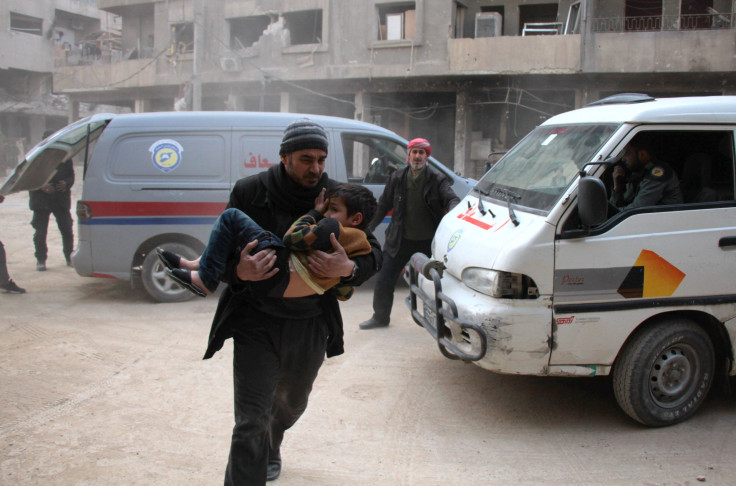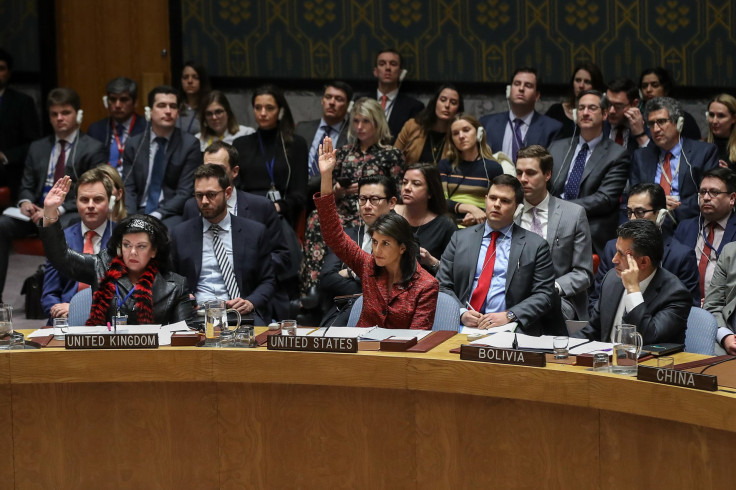US-Russia War Over Syria? Moscow Vows Retaliation To Possible US Military Strikes

UPDATE: 7:31 a.m. EDT — President Donald Trump wrote in an early morning tweet Wednesday that Russia should "get ready" for a military clash in Syria. Trump's comments came hours after Russian ambassador to Lebanon Alexander Zasypkin said they will shoot down any American missiles fired at Syria. In response to Trump's tweet, Russian foreign ministry spokeswoman said: "Smart missiles should fly toward terrorists, not legal government."
As the United States and Russia continue to clash over a possible military confrontation in Syria, following allegations of the Syrian regime using a chemical attack, Moscow said Wednesday it will respond immediately under such circumstances. On Wednesday, Russia's Defense Committee at the Russian Federation Council said Moscow won't hold back if its military was hit by possible U.S. airstrikes in the Middle Eastern country.
The comments came as Moscow and Washington blocked attempts by each other in the United Nations (U.N.) Security Council to set up international investigations into the chemical weapons attacks in Syria early April. President Donald Trump and Western allies of the U.S., including the United Kingdom and France, have been discussing possible military action to strike at Syrian President Bashar Assad’s forces, which they blame for the chemical gas attack on the Damascus suburb of Douma on April 7, which killed at least 60 people and injured over 1,000.
Russian Ambassador to Lebanon Alexander Zasypkin also said Wednesday that any American missiles fired at Syria will be intercepted and shot down, Lebanese media reported.
On Monday, Trump warned of a quick, forceful response to the alleged chemical attack and promised “major decisions” by Wednesday that would outline the country’s response to the Douma attack. However, on Tuesday, Russia vetoed a U.S.-drafted text that would have formed a group with the mandate and authority to assign blame for the chemical attacks. This was the twelfth time Moscow opposed any such action against Assad, its close ally, since the Syrian conflict started.
“I would once again ask you, once again beseech you, to refrain from the plans that you’re currently developing for Syria,” Russian U.N. Ambassador Vassily Nebenzia said Tuesday, after the council failed to approve a third draft resolution.
Addressing the Security Council, U.S. Ambassador to the U.N. Nikki Haley said the Washington-drafted resolution was “the bare minimum that the council can do to respond to the attack.” Referring to Assad, Haley said: “History will record that, on this day, Russia chose protecting a monster over the lives of the Syrian people.”

In response, her Russian counterpart, Vassily Nebenzia, said: “Why do you need this mechanism when you have already appointed the guilty party before the investigation?” Nebenzia accused the U.S of trying to mislead the international community and said it amounted to “taking one more step toward confrontation.”
Earlier, Moscow said that a military strike by the U.S. in Syria was unlikely.
Russian Foreign Minister Sergei Lavrov's deputy, Mikhail Bogdanov, called the threat of a military strike in Syria “extremely dangerous” but added that he did not think a direct military clash with the U.S. was likely. “I think it does not exist,” he told reporters Monday. “I believe that common sense should prevail over insanity.”
Meanwhile, The Hague-based Organisation for the Prohibition of Chemical Weapons (OPCW) was investigating the chemical attack after it was approached by the Assad government and Russia to conduct the probe, a move believed to have been aimed at averting any U.S.-led action in the region.
“Syria is keen on cooperating with the OPCW to uncover the truth behind the allegations that some Western sides have been advertising to justify their aggressive intentions,” Syria’s state news agency SANA said Monday.
© Copyright IBTimes 2024. All rights reserved.











